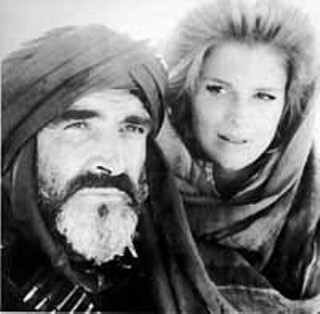The Wind and the Lion
D: John Milius (1975); with Sean Connery, Candice Bergen, Brian Keith, John Huston, Geoffrey Lewis, Steve Kanaly. It is amazing to realize how many of the talented cinematic names of the Seventies and Eighties have lost their luster in the Nineties. Sure, Scorsese and Coppola are legends, and Scorsese's work is still taken seriously, but talents such as Hal Ashby, Michael Ritchie, Paul Schrader, and many others have largely floated under the critical radar. The John Milius story is among the most interesting. The bad-boy, right-wing champion in a largely left-wing Hollywood creative establishment, Milius defended the Vietnam War, collected guns, and loved all things military. He was also an amazing talent, whose work as a director is always inspired but usually seriously flawed -- consider
Big Wednesday (1978),
Red Dawn (1984), and
Farewell to the King (1989). During this decade, he has mostly worked in TV movies. Milius began as a scriptwriter (
The Life and Times of Judge Roy Bean [1972],
Jeremiah Johnson [1972],
Dirty Harry [1971, uncredited]), who broke into directing with
Dillinger (1973). There are those who claim the credit should go to
Conan, the Barbarian (1982), but I claim
The Wind and the Lion, Milius' second directorial effort, as his masterpiece (he also wrote it, as he did with most of his films). Once the celebration of military imperialism was a robust genre, including
The Lives of a Bengal Lancer (1935),
Charge of the Light Brigade (1936),
Gunga Din (1939), and the rousing British epic
The Four Feathers (1939). In the last few decades, most films examining imperialism have been anti-romantic and anti-imperialism, including Tony Richardson's
Charge of the Light Brigade (1968), and
Zulu Dawn (1979). There is a moral imperative to Milius' work which lends it grace and dignity, even when its politics are so reactionary.
The Wind and the Lion is an intentionally romantic, nostalgic ode to raw American imperialism at the turn of the century, with a tip of the hat to the world of robber-baron monopoly capitalism. It was clearly made as a protest against the whole liberal revisionist wave of anti-imperialistic, anti-nationalist films. Milius so lushly realized this romantic adventure, driven by terrific performances by Connery, Bergen, and Keith as Teddy Roosevelt. Connery's rebellious Barbary leader, Mulay el-Raisuli, kidnaps American Eden Pedecaris (Bergen) and her two children. His ends are political but end up having consequences he didn't expect, as this incident is used as an excuse for foreign forces to make their move on Morocco. Meanwhile, the Barbary chieftain and American woman fall in love. The sweep of this movie bleeds to its overwhelming romanticism. In
The Wind and the Lion, there is an exuberance commonly found in Warner Bros. swashbucklers of the Thirties and Forties. This is combined with a sense of vision, a layering of action, and an attention to detail that imbues a comic-book action structure with a sense of reflection and an ideological eloquence. Related more to
The Sea Hawk or
Captain Blood than any political tract, cinematically,
The Wind and the Lion owes much to the work of David Lean and Akira Kurosawa. In Milius' world, action is a viable moral alternative, and through violence you can reach a moment of integrity. "[Peckinpah's]
The Wild Bunch is one of those great films which shows you how to die," Milius observed, "it shows you how to live by showing you where to die." This comment reveals much about the ambitions and moral explorations of Milius' own films. Though he may have a conservative world view -- and in modern Hollywood any kind of ideological underpinning is intoxicating -- it is in the purest and least political sense. As Jonathan Demme once said, "Instead of Milius writing right-wing daydreams, as he is often accused of, I think he is actually writing left-wing nightmares." This opulently romantic celebration of American imperialism certainly presents the contradictions and is one hell of an epic.

